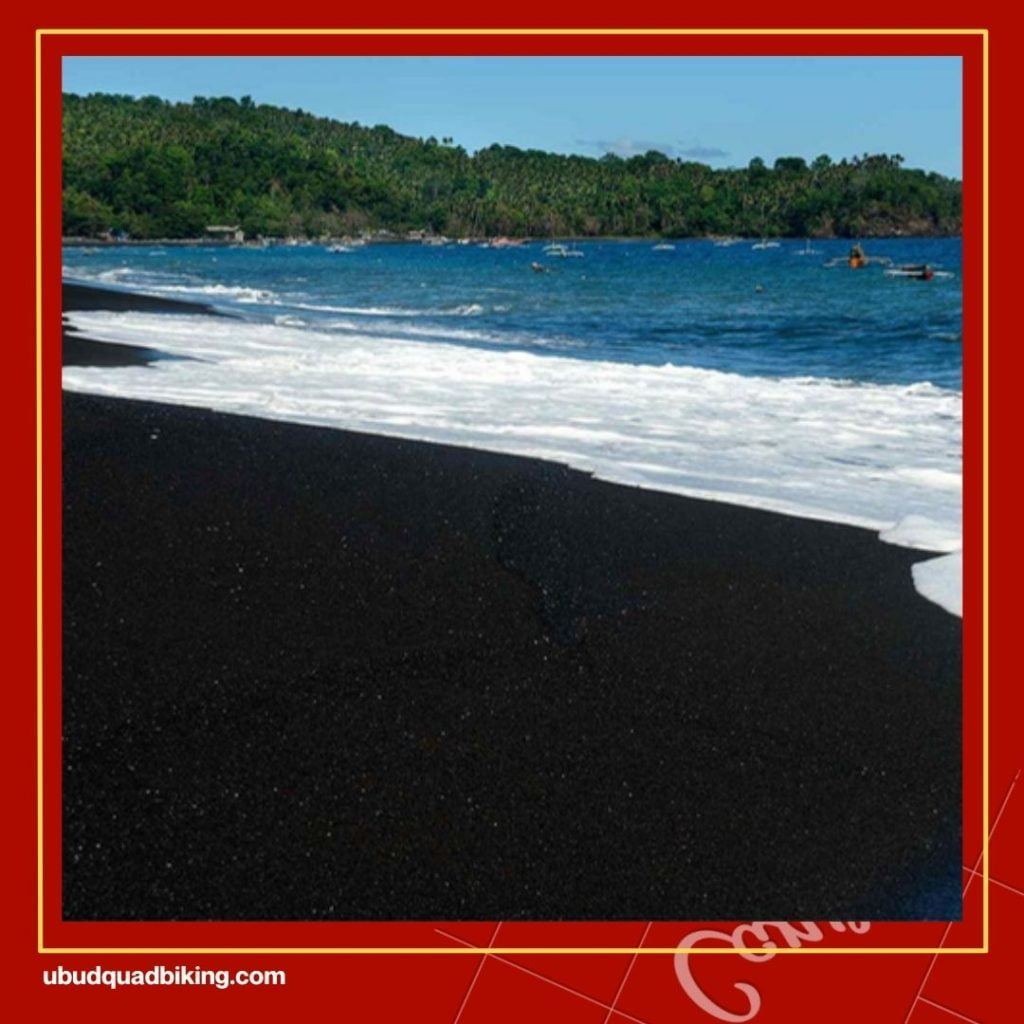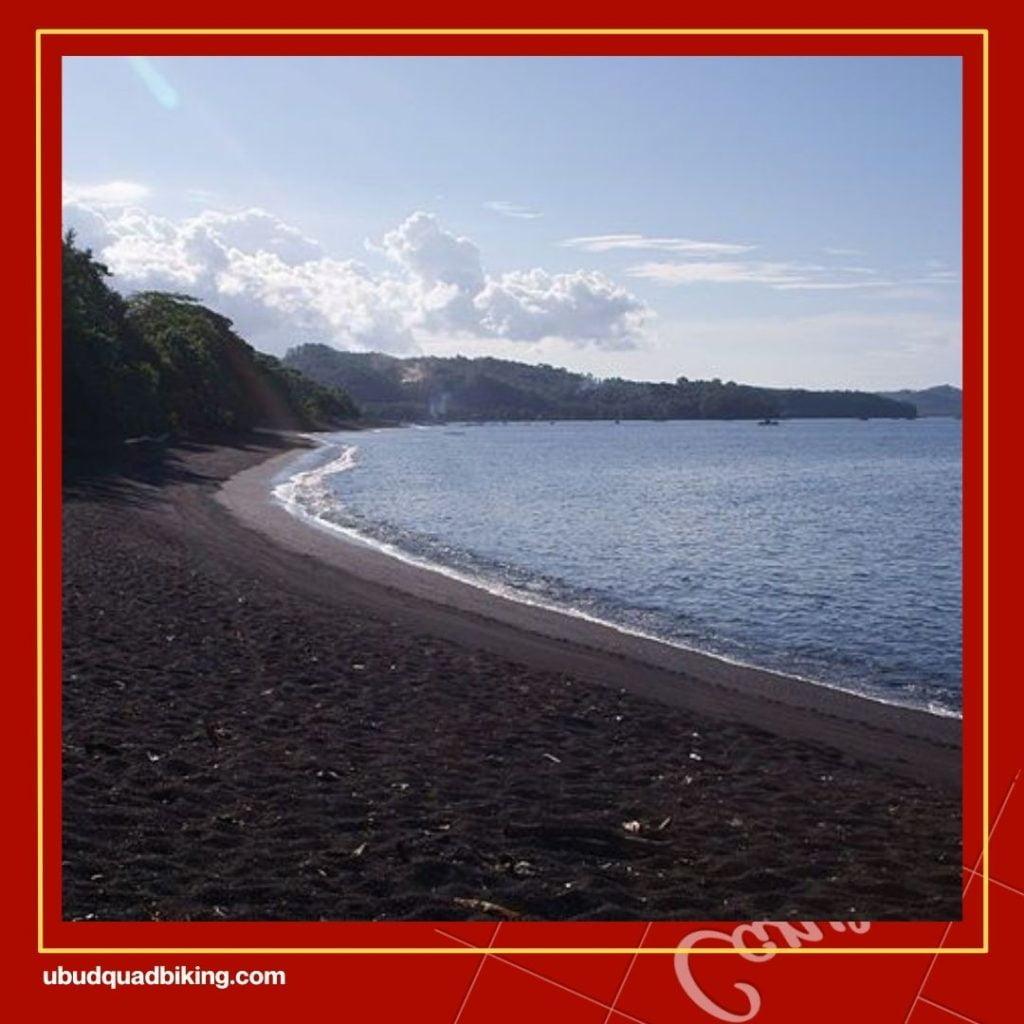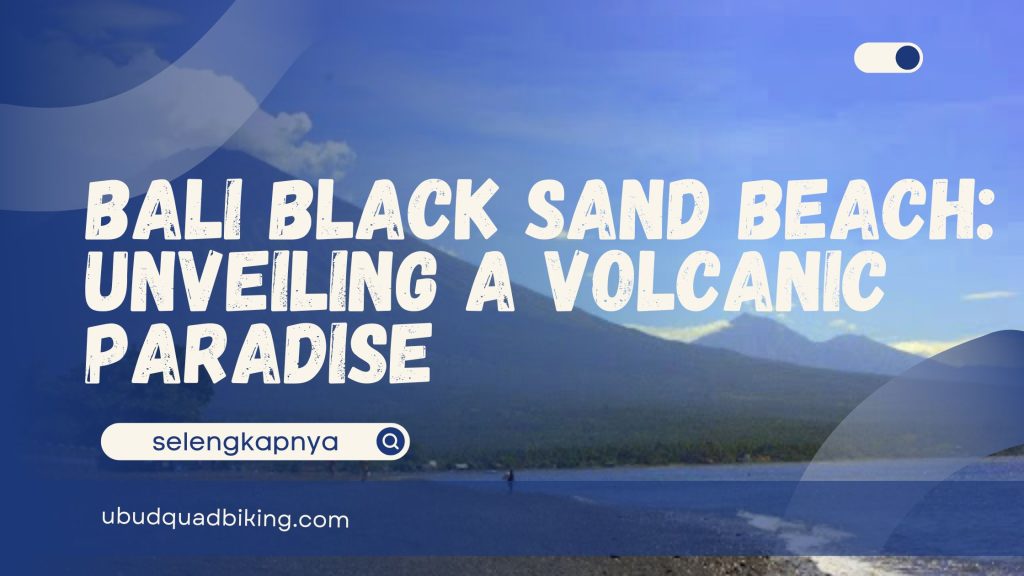Bali, the “Island of the Gods,” is famed for its pristine white sand beaches, turquoise waters, and vibrant culture. However, a hidden gem awaits those who venture beyond the postcard-perfect shores – the dramatic beauty of Bali’s black sand beaches. Formed by volcanic activity, these beaches offer a unique landscape unlike any other, captivating visitors with their stark beauty and contrasting colors.
This guide delves into the captivating world of Bali’s black sand beaches, exploring their geological origins, geographical locations, and the diverse experiences they offer.
Bali Black Sand Beach: A Geological Journey

Bali’s volcanic center forms the island’s striking landscape, including black sand beaches. Over the past century, volcanic eruptions spewed ash and lava that solidified into basalt. The relentless pounding of waves erodes this basalt and turns it into fine, jet-black sand.
The presence of volcanic minerals such as magnetite, a form of iron oxide, gives the sand its characteristic dark color. Interestingly, these minerals are believed to have healing properties, attracting visitors seeking a natural remedy for ailments such as arthritis and skin conditions.
In addition to aesthetics, black sand beaches have a unique ecological niche. Darker sand absorbs heat more efficiently, creating a warm environment where some marine life thrives.
Where to Find Bali Black Sand Beach

East Bali
Amed: A string of charming villages dotting the east coast, Amed boasts several black sand beaches. Tulamben, famous for the wreck of the USS Liberty, a haven for divers, is surrounded by black sand.
Jemeluk and Lipah: Further north, these idyllic beaches offer quiet retreats ideal for sunbathing and relaxation. Here you can enjoy water sports such as kayaking or paddling in calm waters.
Northern Bali
Lovina Beach: Known for its dolphins in the sunrise, Lovin’s beach is another popular black sand destination. Here, volcanic black sand is often mixed with pebbles, creating structural contrast. Here, visitors can enjoy a more relaxed atmosphere and sample local delicacies at beachside snack bars. Explore the nearby Banjar Hot Springs for a rejuvenating dip.
West Bali
Baluk Rening and Yeh Leh: Although not as widespread as in the east and north, you can find black sand beaches in West Bali. These secluded beaches offer a chance to escape the crowds and experience the raw beauty of the black sand shores. If you’re feeling adventurous, try the challenging waves at nearby Balian Beach.
South Bali
Pantai Masceti: Although the south of Bali is dominated by white sand beaches, there is a hidden gem – Pantai Masceti. This isolated beach has dramatic black sand and is a paradise for photographers looking for a unique perspective on Bali.
Experiences at Bali Black Sand Beach

East Bali:
Amed: Watch the majestic sunrise of Mount Agung reflected in the black sand, which is even more stunning. Explore the underwater world of Tulamben, where the Liberty wreck teems with marine life. Take a boat trip to nearby snorkeling spots such as the Coral Gardens or the Japanese Shipwrecks.
North Bali
Lovina Beach: Take a mesmerizing sunrise dolphin ride against the backdrop of black sand for a truly unforgettable experience. Relax on the beach and enjoy the relaxed atmosphere of traditional villages. Explore Aling-Aling Falls, a hidden gem nestled in the rainforest.
West Bali
Baluk Rening and Yeh Leh: Escape the crowds and find peace at these secluded beaches. Enjoy the silence of the black sand beach and the sound of the waves. Hike to Mount Batur for breathtaking panoramic views and watch the sunrise over the volcanic crater lake.
South Bali
Pantai Masceti: Capture breathtaking photos with the dramatic black sands contrasting with the vibrant sky. Explore nearby villages and experience a local Bali culture. Visit the Tanah Lot Temple.
Things You Could Do As A Responsible Tourist
Enjoying Bali’s black sand beach is fun, however, it is best to be a pioneer and good tourist by doing these things
Reduce waste: Avoid single-use plastics and choose reusable water bottles and containers. Properly dispose of any waste generated during your visit. If necessary, use a specified Recycle Bin or a Waste Bag.
Respect local culture: When you visit the village near the beach, you must carry humility. Pay attention to the noise level to avoid religious rituals or local customs. Remember that these beaches are not only tourist destinations but also very important for local communities. Support local businesses: Choose to stay at a local hotel or boarding family instead of a big resort. Local craftsmen who eat Warung and support souvenirs. Your tourist dollars directly affect the lives of people who call these areas home.
Protect the ecosystem: Refrain from removing sand, shells, or coral from the beach. These elements play a crucial role in beach ecosystems. Sand helps maintain shorelines, while shells and corals provide a habitat for marine life.
Be aware of wildlife: Avoid disturbing nesting turtles or birds. If you encounter marine life while snorkeling or diving, keep a safe distance and do not touch or molest the creature. Responsible tourism ensures that the delicate balance of the ecosystem is maintained.
Black Sand Beach Bali : A Testament of Beauty
Bali’s black sand beach offers a captivating departure from the typical beach experience. They are a testament to the island’s volcanic history, a canvas painted with dramatic beauty, and a paradise for unique experiences. Whether you’re looking for tranquility, adventure or an insight into the local culture, Bali’s black sand beaches have something for every traveler.
So next time you visit the ‘Island of the Gods’, look beyond the white sand beaches and discover the enchanting world of Bali’s black sand beaches. You can just discover a hidden gem that will leave a long-lasting impression. Remember, responsible travel is the key to securing the legacy of fire and beauty and continuing to attract visitors for the next few years.

